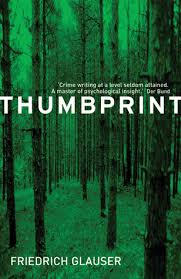Though Friedrich Glauser is described as the ‘Swiss Simenon,’ his life most resembles that of German writer Hans Fallada: an opium and morphine addict, he spent much of his time either in jail or insane asylums, though he did manage to fit in two years in the Foreign Legion. Thumbprint is the first of his Sergeant Studer novels, all five of which have been translated into English by Mike Mitchell and published by Bitter Lemon Press (Glauser died at the age of forty-two and therefore certainly did not match Simenon for productivity) Even in this first novel, Studer is old for his rank having lost his position in another force for what are hinted to be political reasons, creating an impression he is both a maverick and incorruptible.
Initially we are invited to consider that the murder in Thumbprint is
“…an open and shut case. Wendelin Witschi, travelling salesman, had been found on Wednesday morning lying on his front in a wood not far from Gerzenstein with a bullet hole behind his right ear. His pockets were empty but the murdered man’s wife claimed her husband had three hundred francs on him… And on Wednesday evening Schlumpf had paid for a few drinks in the Bear with a hundred-franc note.”
The novel begins, however, with Studer saving Schlumpf’s life, returning, having arrested him that morning, to find him hanging by his belt:
“Why? Because he had never had a son of his own? Because the man had kept protesting his innocence during the journey here? No. They were all innocent. But Schlumpf’s protestations had sounded genuine.”
Studer decides (of course) to follow his gut feeling that “there was something not quite right about the whole business” and persuades the examining magistrate on the case to allow him to investigate further.
Once in Gerzenstein, the case appears more open than shut, with a steady procession of suspicious characters parading in front of Studer: Witschi’s daughter, Sonja, who was also Schlumpf’s fiancée; his son, Armin, generally to be found in a local bar flirting with the waitress; Schlumpf’s boss, Ellenberger, who habitually employs ex-cons (thus, at a stroke, creating even more suspects); and Aeschbacher, the mayor, and Witschi’s brother-in-law. Witschi, naturally, has money troubles, but suicide is ruled out by the absence of powder burns and the angle of the wound – at least at first. A gun and bullet cases are found – but not in the same place, and pointing towards entirely different theories as to why Witschi died.
Glauser not only shares his intricate plotting with Simenon, with its feints and false turns, but Studer, like Maigret, is an instinctive detective who takes things at his own pace:
“It was never a good idea to plunge straight into a case, like a pig at the trough.”
Similarly, the reader is only allowed occasional glimpses into his thought process if he discusses the case. Meanwhile he sometimes befriends, and at others provokes the various witnesses and suspects. Frequently he simply watches:
“He squinted across at Armin’s table. Something seemed to be going on.”
Glauser is particularly adept at adding twist upon twist to the narrative without ever losing credibility. The possibility that Witshci may have committed suicide, for example, is juxtaposed with Schlumpf’s confession. Adding to the jeopardy is Studer’s worsening health as the novel progresses:
“Studer shivered. The stabbing pain in his chest was back. He broke out in a cold sweat.”
Yet even a visit to a doctor simply provides him with an opportunity to use his microscope to examine evidence.
Thumbprint is an excellent crime novel, one I can’t imagine any connoisseur of the genre being disappointed in. My only disappointment is that there are no more than four others to look forward to.
Tags: Friedrich Glauser, german literature month, thumbprint


November 20, 2016 at 8:26 am |
A very nice find, Grant. Studer sounds like an astute detective who uses a healthy dose of intuition to solve his cases, always a good thing in this type of fiction. It’ll be interesting to see how his character develops over the course of the series. In the meantime, I’m off to see if I can find a copy of this one!
November 21, 2016 at 6:47 pm |
Again, I can imagine you will thoroughly enjoy this. I liked the pace of it, its cast of characters, and the constant twists and turns which never seemed strained.
November 20, 2016 at 8:53 pm |
Sounds really good Grant – and yet another author new to me. In some ways, bearing in mind the size of my TBR, I’m glad he wasn’t as prolific as Simenon….
November 21, 2016 at 6:48 pm |
As someone who is trying to read the Penguin Simenon’s (only about fifteen behind!) I can thoroughly appreciate that!
November 21, 2016 at 2:23 pm |
Definitely a nice find, and like Kaggsy I’m rather glad he wasn’t so prolific. I’m a bit loath to start a new series presently but I hope you get to read more of these as I’d like to see how it develops.
November 21, 2016 at 6:49 pm |
Yes, I certainly plan to read more. It is reassuring to know that I can read the whole series relatively quickly if I want to!
October 25, 2017 at 10:42 am |
[…] Inkheart 1 Georg : Poems 1 Giordano: Auntie Poldi and The Sicilian Lions 1 Glauser: Thumbprint 1 Glavinic: The Camera Kille 1 Gmeyner: Manja 1 Goethe: Italian Journey 1 2 3 Italian Journey […]